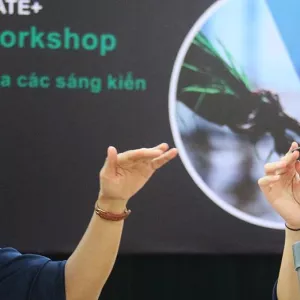Building a Learning Alliance for Living Labs in Vietnam’s Mekong Delta
A collaboration between the CGIAR Initiatives on Asian Mega-Deltas (AMD) and Low-Emission Food Systems (Mitigate+), a Learning Alliance for Living Labs workshop was organized by the International Rice Research Institute (IRRI) in Can Tho City, Vietnam on 6 December 2022 to form a network of diverse stakeholders within the region, that has an interest to address climate-related issues in the

Building a Learning Alliance for Living Labs in Vietnam’s Mekong Delta
A collaboration between the CGIAR Initiatives on Asian Mega-Deltas (AMD) and Low-Emission Food Systems (Mitigate+), a Learning Alliance for Living Labs workshop was organized by the International Rice Research Institute (IRRI) in Can Tho City, Vietnam on 6 December 2022 to form a network of diverse stakeholders within the region, that has an interest to address climate-related issues in the Mekong Delta.
In her opening remarks, Dr. Katherine Nelson, climate change specialist at IRRI and work package leader for both AMD and Mitigate+, shared that the goal of the workshop is to “form a province-level learning alliance and innovation network to help identify and co-create good practices to adapt to and mitigate climate change.” She also elaborated on the concept of ‘Living Labs for People’, which is a participatory action research approach to engaging and supporting stakeholders and partners in important food systems to co-design, tailor, and test integrated innovation packages to reduce greenhouse gas sources and enhance sinks while improving social equity.
The core members of the Learning Alliance for Living Labs included researchers and experts from IRRI as facilitators and was attended by various stakeholders representing: local government agencies, specifically focusing on plant protection, extension, and irrigation services; farmer groups and cooperatives, including rice and non-rice crops; private sector, specifically input suppliers and service providers, contractors, and fertilizer companies.
Facilitating the workshop, Dr. Rica Joy Flor, Innovation Systems Scientist in IRRI Cambodia, shared the various steps that need to be undertaken in the workshop, such as: causal analysis through problem trees, opportunities assessment, prioritizing opportunities of interest, stakeholder assessment, and the visioning exercise.
For the problem tree and opportunities assessment, Dr. Flor requested the participants to identify the main production constraints due to climate impacts that they have experienced and…

